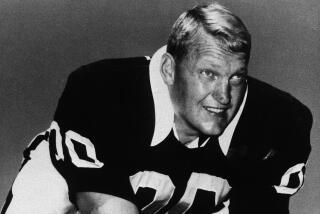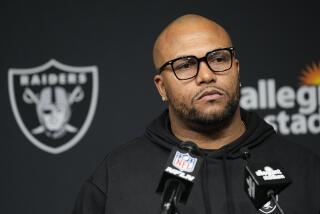Player Representatives Find Concern About Image of Game
- Share via
Mike Davis, the Raiders’ strong safety and union representative, believes that National Football League players can be effective in policing any drug abuse problem in their ranks.
“If a player knows another player is using and he’s a liability to the team, enough pressure will be put on him to turn himself in,” Davis said.
But he also said that the union and owners must agree on an effective program.
“We have to mop up this mess, see if we can come up with an agreement to have a reasonable drug-testing format that will gain respect in the public eye,” Davis said.
The player representatives currently are surveying the ranks. The early consensus, according to Davis: “The fellas are really concerned about the image of our livelihood. If a player is caught dirty once, he should be suspended and fined (to) let the public know we’re on it. But you can’t treat it as a criminal act. It’s a disease.
“There are players coming into the league that are users already. When you come into the NFL, you don’t automatically get handed a drug kit. It’s not the NFL that turns players into junkies.”
Davis and Carl Ekern, the Rams’ player representative, agree that the New England Patriots’ players bungled when they voted the day after the Super Bowl to allow spot testing for drug abuse on the squad.
Davis said that the Patriots probably were too distraught after their 46-10 defeat by the Chicago Bears to be thinking clearly, especially when New England Coach Raymond Berry threatened to resign if they didn’t approve the measure.
“They handled it very improperly,” Davis said. “Raymond Berry said he knew of it early in the year. He should have done something about it then.”
Ekern said: “There is a system in place (in the 1982 collective bargaining agreement). I don’t know why New England felt they had to circumvent it.”
Ram management, acting on the “reasonable cause” provision of the agreement, sent three players through a treatment center last season. When St. Louis players balked at taking postseason tests, the Rams were still in the playoffs, but Ekern sought to head off a similar confrontation.
“I went to the trainers and (Coach) John Robinson and asked if they planned to (have postseason testing),” Ekern said. “They said they’d never done it in the past and didn’t plan to this time.”
Davis said the Raiders haven’t had a problem in recent years. “In 1980, we had a bit of a problem . . . more than two (players),” he said. “But that was quickly cleared up and we haven’t had a problem since.”
When the Patriot scandal broke, Raider owner Al Davis issued a statement calling for “a strong program and someone with the guts to enforce it”--an obvious shot at NFL Commissioner Pete Rozelle.
Mike Davis said: “I agree we have to take a long, hard look at it, (but) the drug issue is blown out of proportion. There are more non-users than users. New England, with 12, is the most I’ve ever heard of on one team.”
Davis was more disturbed about another aspect of the Patriot scandal. He noted that the Patriots had apparently leaked the names of only six players--all black.
“The No. 1 stereotype is a black guy makes good, he’s making a lot of money, so he’ll go and spend his money on drugs,” Davis said. “I say this with no feeling of prejudice or racism whatever, and I hope nobody takes it that way, but unfortunately, just all black guys have been named.
It’s not fair, because it’s on the other side, too. Why didn’t New England name the other players? The public needs to be made aware that it’s not only a black athletes’ problem or a black persons’ problem.”


